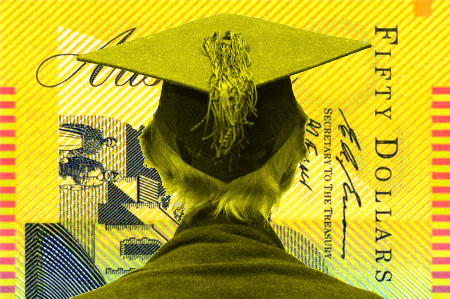Uni money tightened
 University students will pay up to $3600 more for their degrees under a proposed tertiary education overhaul.
University students will pay up to $3600 more for their degrees under a proposed tertiary education overhaul.
Student loan repayment thresholds will be lowered to $42,000 under the Turnbull Government’s latest plan, which also includes a 2.5 per cent efficiency dividend on universities.
Education Minister Simon Birmingham says it is time to tighten the rules because university revenue is growing faster than costs.
“We start from clean slate with a guarantee that no student will pay a cent upfront for their higher education, students will no longer face fee-deregulation and universities will not face a 20 per cent cut to their funding,” Senator Birmingham said.
Since 2009, Birmingham says student funding has increased by 71 per cent, “twice the rate of growth of the economy”.
“Outstanding taxpayer funded student loans have tripled since 2009, now standing at more than $52 billion,” he said.
“Without changes to address this situation, around a quarter of that is expected to go unpaid.”
The new plan includes;
- 2.5 per cent efficiency dividend in 2018 and 2019 on payments for teaching, set to cut about $2.8 billion
- Phased increases in course fees from 1.8 per cent in 2018 up to 7.5 per cent in 2021
- An average increase in the proportion of fees paid by students from 42 per cent to 46 per cent – meaning the maximum for a four year degree will be $50,000, while a six-year medical degree will cost at most $75,000
- Increase in funding for dentistry and veterinary courses to bring them into line with medicine courses
- Reduction in the repayment threshold for HECS-HELP loans to $42,000 from July 2018 from its current level of about $55,000
- Minimum repayment threshold for loans to be indexed to inflation rather than average weekly earnings
- The linking of 7.5 per cent of university funding to new performance measures - a transparency of enrolment process from 2018, and student retention measures from 2019.
- $3 million funding for education quality watchdog TEQSA
- $15 million to fund eight regional study hubs starting with Geraldton, Cooma and the Pilbara
- $37 million for a new postgraduate scholarship scheme that lets students choose their own institutions
New Zealand is one of the first to find issue with the new plans.
The changes would force New Zealand expatriates to pay full fees to go to university, rather than enrol under the Commonwealth Supported Placement (CSP) Australian students can access.
“We're pretty unhappy about it,” New Zealand's prime minister Bill English said.
“We want a serious discussion with them about where they're headed with this policy, rather than announcements that are made either without telling us or at short notice.”
Mr English said there has been a mutually-beneficial arrangement between the two nations, but it has been eroding since changes made by former prime ministers Helen Clark and John Howard.
“There is now significant uncertainty about that traditional arrangement,” he said.
“We need to have a discussion with them about the general policy so that people aren't surprised, and to minimise the uncertainty particularly for New Zealanders in Australia, who I'm sure don't know just what might happen next.”
New Zealand Foreign Minister Gerry Brownlee will visit Australia on Thursday.
As to whether the changes would pass the senate - Liberal Democrat Senator David Leyonhjelm says he supports much of the package, Tasmanian Senator Jacqui Lambie is strongly opposed, The Greens say they are opposed, while the Nick Xenophon Team, independent Senator Cory Bernardi, independent Senator Derryn Hinch and One Nation senators have not reached a position.








 Print
Print